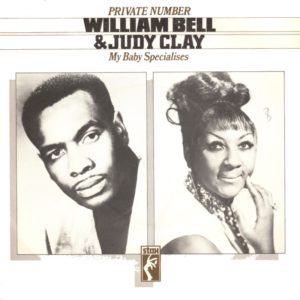This week’s classic soul record is very much a duet from two great singers. I have written about William Bell before in this column, and probably will again. Suffice to say that he is not only still active at the age of 78, he won a Grammy for his most recent album, last year’s This is Where I Live. But this week I’m going to focus on his duet partner, Judy Clay.
She was born in North Carolina in 1938, with the name Judith Grace Guions. She lived in Fayetteville with her grandmother until she moved to Brooklyn in her early teens. There, she became a member of the Drinkard Singers family gospel group. It was a group that at one time had notable members like Cissy Houston, and her nieces Dionne and Dee Dee Warwick. The Drinkard Singers eventually morphed into the Sweet Inspirations.
Clay’s first recording experience came with the Singers on their album The Newport Spiritual Stars, in 1954. She stayed with the group for six more years before departing for a solo career. She signed with Ember Records but her first single for the label, “More Than You Know,” didn’t do much business. Labels like Lavette, Scepter, and Stax followed, but success proved to be elusive for Clay.
She got her big break in 1967 when Jerry Wexler of Atlantic Records decided to pair her with Billy Vera. They were the first racially integrated duo in American history, and they teamed up with the Sweet Inspirations to record “Storybook Children.” Unfortunately, people were not ready for an integrated couple, and despite the fact that Clay was married to jazz drummer Leo Gatewood and pregnant at the time, it was assumed that Clay and Vera were a couple and that the child was his.
Nevertheless, the song was a hit, reaching #20 on the R&B chart, and #54 on the Pop chart. But when it came to performing it on network television, the ugly specter of racism reared its head again and the song was performed by Nancy Sinatra and Lee Hazelwood.
In his Judy Clay obituary for The Guardian in 2001, Vera wrote:
“Other than an appearance on Hy Lit’s show on WKBS in Philadelphia, and one on Robin Seymour’s Swingin’ Time in Detroit, our little revolution was never televised.”

Vera and Clay had another hit for Atlantic, “Country Girl, City Man,” which did almost as well as “Storybook Children,” and there was also a duet album for the label. Perhaps tiring of the racism that was blocking the duo from a wider appeal, Clay decided to return to Stax Records. There she was teamed with William Bell, and together they recorded “Private Number” in 1968.
The song was written by Bell and Booker T. Jones, and produced by Jones. The single reached #17 on the R&B chart and #75 on the Pop chart. It didn’t even better in the U.K., where it soared all the way to #8 on the singles chart. The duo charted one more time with “My Baby Specializes,” before Clay returned to Atlantic for one more single with Vera, “Reaching for the Moon.” She also had one last solo hit with “Greatest Love” in 1970.
After that Clay became an in-demand backup singer, working with luminaries like Ray Charles, Aretha Franklin, and Wilson Pickett. She returned to gospel music after recovering from a brain tumor in 1979, and on occasion sang with Cissy Houston’s choir in Newark. It was complications from a car accident that eventually took Clay’s life in 2001. She was 62 years-old.
In his obituary, Vera concluded: “With Judy’s passing, we have lost a great singer who never got her due.”





Comments